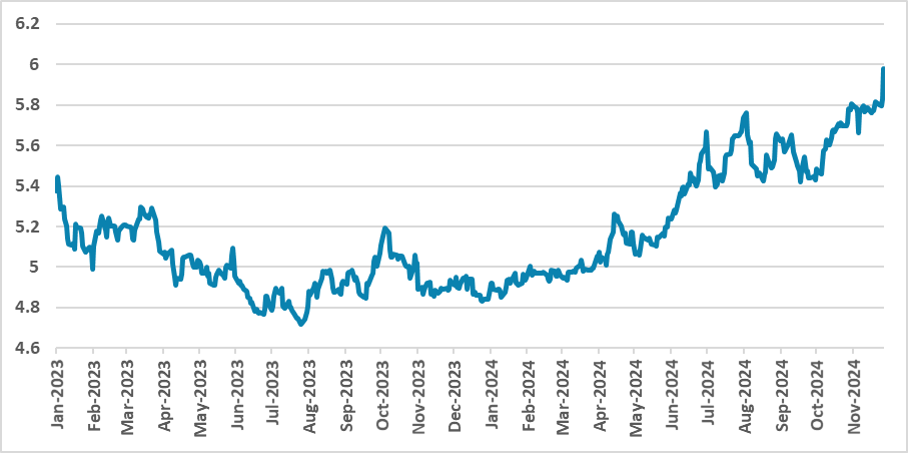Brazil: Timid Fiscal Package Presented
Brazil's Finance Minister Fernando Haddad introduced a fiscal package to improve the country's fiscal position without direct budget cuts. Key changes include adjusting the minimum wage growth to align with a new framework limiting expenditures to a maximum of 2.5% in real terms. Other measures restrict social benefit growth and military pension changes. While the market has reacted negatively, the government anticipates saving BRL 70 billion over two years. Concerns remain about revenue growth sustainability and potential impacts on fiscal feasibility amid economic fluctuations.
Figure 1: USD/BRL

Source: BCB
Brazil's Finance Minister Fernando Haddad has presented a fiscal package aimed at improving Brazil's fiscal position. It is important to note that rather than presenting direct cuts in the budget, the measures announced tend to adjust the pace of growth of some expenditures so they fit the new fiscal framework.
The measure focuses on changing the adjustment rule for the minimum wage. Previously, the rule was tied to the nominal growth of GDP; as the new fiscal framework limits expenditure growth to up to 2.5% in real terms, at some point, the minimum wage could grow above the confines of the fiscal framework. Since several expenditure growths are tied to the minimum wage, the current rule could jeopardize the feasibility of the fiscal framework. Now, the minimum wage will grow according to the fiscal framework rule, capped at a 2.5% growth rate.
Another measure is limiting the growth of the social benefit salary bonus, which applies to families earning up to 2 minimum wages. The individual benefit, which currently corresponds to two minimum wages per annum, will now be readjusted only by inflation until it reaches 1.5 minimum wages. Additionally, the growth of Congress's budgetary amendments, which are part of the budget controlled by Congress, will also have its growth limited by the fiscal framework, with 70% of revenue growth capped at 2.5% in real terms. Furthermore, changes to the military pension system were announced, with marginal alterations to some benefits schemes.
The most controversial measure concerns the income tax exemption for individuals earning less than BRL 5,000 (around USD 800) monthly. The impact of this measure amounts to BRL 40 billion (around 0.4% of GDP). The government plans to finance this exemption through a new tax on the wealthy who earn more than BRL 50,000 (around USD 8,000). Whether this compensation would be sufficient to create a zero net effect is unclear.
The market has not received the package well, as it is seen as insufficient to quickly reverse the fiscal path of Brazilian finances. Government estimates indicate that this measure could save up to BRL 70 billion (around 0.5% of the GDP) over two years, but this figure refers to not allowing additional growth in expenditures. The BRL/USD exchange rate plummeted to around 5.91, its all-time high, with part of this movement being driven by a negative sentiment surrounding the package.
We view this package as mostly positive, allowing the fiscal framework to make more sense in the medium term, as it ensures that expenditures grow within the limits of the fiscal framework. However, we have concerns about the zero net effect of the tax exemption measure. Revenue growth has been strong throughout the year, increasing by around 9% in real terms. The government bets that this trend will continue in the coming years, and with revenue growth surpassing expenditures, fiscal consolidation could gradually become a reality. With two consecutive years of growth above 3%, some doubts still remain about whether this will be the new trend or merely a narrowing of the gap with idle capacity. Weaker economic activity, generating lower revenue growth, could jeopardize the feasibility of the fiscal framework, and we will be very attentive to this in the coming year.